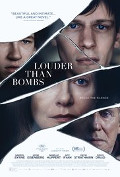
Directed by
Joachim Trier
109 minutes
Rated M
Reviewed by
Sharon Hurst

Louder Than Bombs
Synopsis: Prominent war photographer Isabelle Reed (Isabelle Huppert) is killed in a car crash, leaving behind her husband Gene (Gabriel Byrne) and two sons. The younger, Conrad (Devin Druid), is not coping, escaping into violent video games and clashing with his father, while older married son, Jonah (Jesse Eisenberg), comes home to help his father organise a retrospective exhibition of his mother's work while grappling with recent fatherhood and his own marital issues. To make matters even more fraught, Isabelle’s journalist colleague (David Strathairn) is intending to publish an article which may reveal some skeletons in the family closet.
This intense family drama from Norwegian director Joachim Trier portrays a tried-and-true theme – that of a family coping with grief and the fraught interrelationships between parents and children, husbands and wives. There is much to recommend it but also a niggling feeling that not everything hangs together in a unified and satisfying whole.
It is refreshing to see Byrne playing a sensitive father more in tune with emotion than your typically removed screen dad. Gene is an actor who has switched to teaching so that he can be closer to his sons, but he is also a fragile and weak person grappling with his own grief, his need for new companionship, and his inability to connect to his sons or even manage the hostility he cops from Conrad. Byrne balances all this in a sensitive and nuanced performance. Similarly it is good to see Eisenberg, often a bland performer getting into a more emotionally-challenging role although I had reservations about aspects of his characterization and dialogue in terms of credibility. Young Druid as Conrad promises to be a formidable actor – he captures well the dysfunctionality of the child who cannot in any way confront his feelings. Finally Huppert, always a compelling actor and a sympathetic screen presence is strong in her role of a committed career woman trying to juggle family life with traipsing from one war-torn zone to another. While always confident in her work she is a more insecure person in her home life. Audiences will draw comparisons with the character played by Juliette Binoche in last year's A Thousand Times Goodnight
Trier goes for the much-employed device of toggling between past and present to show us how each of the males related to Isabelle and also weaves characters’ dreams and memories into the narrative, giving us a sense of their inner workings. These scenes are shot in a poetic and dream-likea, stream -of-consciousness way, although at times this feels pretentious, seemingly at odds with the more pragmatic sensibility of the rest of the film, the result being an uneven tone.
Still photography also plays a big role in the film and the images used are powerful and moving, capturing the pain and trauma of war. There are also photos Gene finds on a lost SD card – photos of Isabelle in pensive mode, and revealing possibilities that she was going through her own inner pain of which her family were unaware.
Despite certain flaws and an unevenness in tone, the film, nominated for a Palme D’Or at Cannes, is a worthwhile and sensitive look at the process of grief and its relationship to family dynamics and memories.

Want more about this film?


Want something different?




